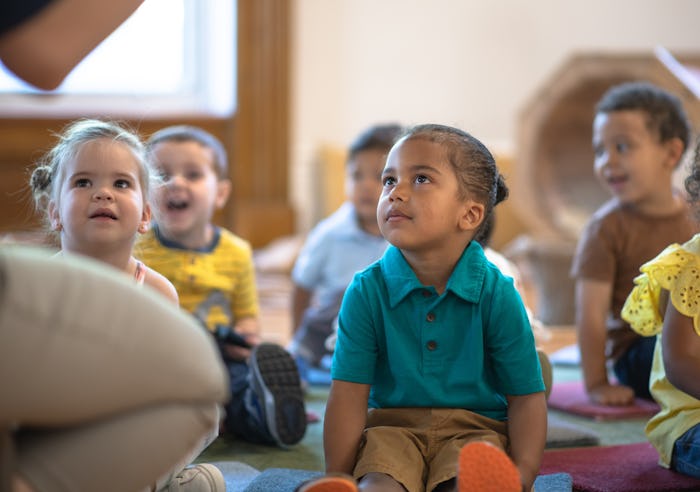News

Congress Urged To Support "Essential" Child Care Programs Amid Coronavirus Outbreak
With a growing number of confirmed cases of the novel coronavirus in the United States, a coalition of public policy experts have called on Congress to take swift and immediate action in support of child care and early learning providers across the country. In a letter to Congress, advocates highlighted that child care programs need emergency funding amid the coronavirus outbreak as they are vital to not only the nation's economy, but to many families as well.
"Child care is so essential to our economy and central to family well being," Karen Schulman, The National Women's Law Center's (NWLC) child care and early learning research director, tells Romper. "And it is already very vulnerable, particularly in a case like this where there is so much disruption." Some 38 organization have joined the NWLC in urging Congress to support child care and early learning programs during the coronavirus outbreak.
According to Schulman, the ongoing coronavirus outbreak has placed child care providers in a uniquely difficult situation. So far, more than 1,250 schools have closed or announced plans to close, impacting an estimated 856,520 students, according to Education Week. As schools across the country close, parents unable to work from home or take time off work may turn to child care programs for help, increasing their workload and need for resources. Or perhaps the growing popularity of telecommuting results in fewer families using child care programs, thereby cutting into the already thin financial margins many child care programs have.
Additionally, some child care and early learning programs may be forced to close due to concerns over the spread of coronavirus, potentially jeopardizing child care providers and their families with a loss of income. A coronavirus stimulus package for child care and early learning programs could also enable providers to ensure staff have access to paid sick leave, proper cleaning supplies, and any necessary training regarding coronavirus.
"We have to consider all of those options and that’s why substantial funding is really critical," Schulman tells Romper. "This is where we need the federal government to step up."
What's more, advocates warned Congress that while the coronavirus outbreak, which has infected nearly 120,000 people worldwide and the World Health Organization officially declared a global pandemic on Wednesday, is likely to be temporary, its impact on child care and early education programs could be long-lasting.
"Child care is the backbone of our nation’s economy; without it, millions of parents cannot go to work or attend school, and the U.S. economy suffers billions of dollars in losses," the coalition wrote in their letter. "Child care programs in every state already operate on razor thin margins and teeter on the edge of financial health. Issues that may appear temporary — for instance when children are absent and providers are not reimbursed, or when programs have to pay substitutes to cover for sick staff members — could cause widespread permanent closures and result in catastrophic impacts on children, families, businesses and our economy in the short and long term."
They urged Congress to provide "robust flexible emergency funding" that could be used to purchases necessary supplies or cleaning services, fund programs and workers in instances of coronavirus-related closures, cover the cost of continuing to serve parents unable to meet tuition or co-payment fees, and pay for additional or substitute caregivers and educators. What's more, they asked funding be provided to programs based on enrollment, not attendance.
"[Child care] is so central to making our economy work day after day. And it's also essential to women, it's essential to the well being of children," Schulman tells Romper. "That is why, as we look at what's affected by coronavirus in our economy, we have to really key in on this sector."
If you think you’re showing symptoms of coronavirus, which include fever, shortness of breath, and cough, call your doctor before going to get tested. If you’re anxious about the virus’s spread in your community, visit the CDC for up-to-date information and resources, or seek out mental health support. You can find all of Romper’s parents + coronavirus coverage here, and Bustle’s constantly updated, general “what to know about coronavirus” here.